Democratic Debaters United on Need For Climate Action
Air Date: Week of January 17, 2020
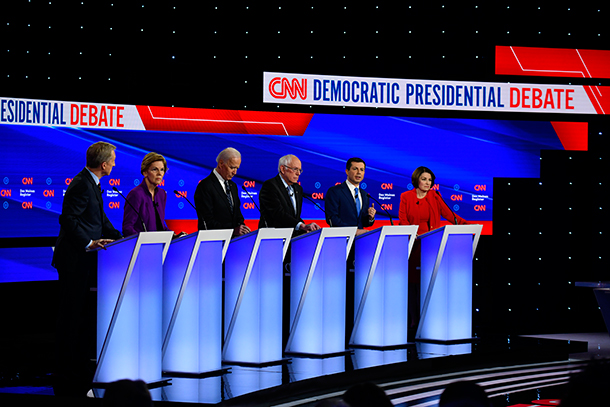
The six Democratic presidential candidates at Drake University in Iowa for the debate before the Iowa caucuses. From left to right: Tom Steyer, Elizabeth Warren, Joe Biden, Bernie Sanders, Pete Buttigieg, and Amy Klobuchar. (Photo: CNN)
At the final Democratic primary debate before the 2020 Iowa caucuses, the six top polling candidates onstage all discussed their concerns about climate impacts and their plans for addressing the problem and broadly agreed on the need to address climate disruption. CNN and the Des Moines Register hosted the debate in Des Moines, Iowa, and Host Steve Curwood highlights the main climate change moments from the evening.
Transcript
BASCOMB: From PRX and the Jennifer and Ted Stanley studios at the University of Massachusetts Boston, this is Living on Earth. I’m Bobby Bascomb.
CURWOOD: And I’m Steve Curwood.
The cable news network CNN and the Des Moines Register hosted a debate in Iowa on January 14th among the six top polling Democratic candidates for President, just nineteen days before the Iowa caucuses. One of the debate moderators was Brianne Pfannenstiel, she is the chief politics reporter for the Des Moines Register.
PFANNENSTIEL: Let's turn now to the climate crisis. Here in Iowa parts of the state remain under water after record-breaking flooding began last spring, racking up an estimated $2 billion in damages. Today many Iowans are still displaced from their homes. Mayor Buttigieg, you have talked about helping people move from areas at high risk of flooding. But what do you do about farms and factories that simply can't be moved?
BUTTIGIEG: That's why we have to fight climate change with such urgency. Climate change has come to America from coast to coast. Seeing it in Iowa. We have seen it in historic floods in my community. I had to activate our emergency operation center for a once-in-a-millennium flood. Then two years later had to do the same thing. In Australia there are literally tornadoes made of fire taking place. This is no longer theoretical and this is no longer off in the future. We have got to act, yes, to adapt, to make sure communities are more resilient, to make sure our economy is ready for the consequences that are going to happen one way or the other. But we also have to ensure that we don't allow this to get any worse. And if we get right, farmers will be a huge part of the solution. We need to reach out to the very people who have sometimes been made to feel that accepting climate science would be a defeat for them, whether we're talking about farmers or industrial workers in my community, and make clear that we need to enlist them...
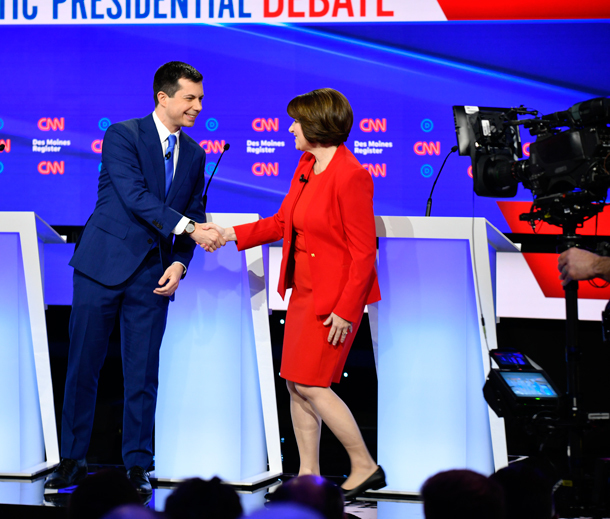
Both Senator Amy Klobuchar of Minnesota and former South Bend, Indiana Mayor Pete Buttigieg plan to use market incentives to fight climate change. (Photo: CNN)
PFANNENSTIEL: But, Mayor Buttigieg...
BUTTIGIEG: ... in the national project to do something about it.
PFANNENSTIEL: ... to clarify, what do you do about farms and factories that cannot be relocated?
BUTTIGIEG: We are going to have to use federal funds to make sure that we are supporting those whose lives will inevitably be impacted further by the increased severity and the increased frequency. And by the way, that is happening to farms, that is happening to factories, and that disproportionately happens to black and brown Americans, which is why equity and environmental justice have to be at the core of our climate plan going forward.
PFANNENSTIEL: Thank you, Mayor Buttigieg.
CURWOOD: Next up, was Tom Steyer.
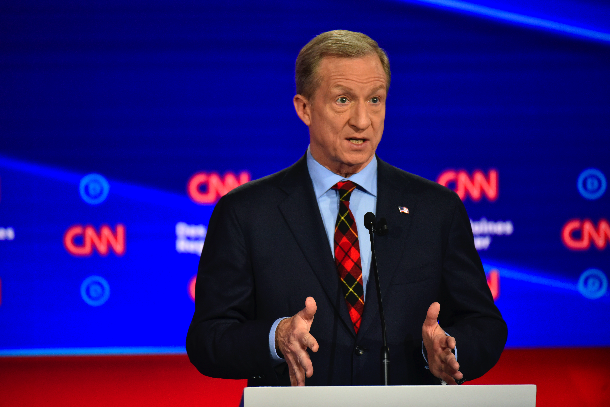
Tom Steyer says he will declare climate change as a national emergency and invest in infrastructure resilient to natural disasters. (Photo: CNN)
STEYER: Look, what you're talking about is what's called managed retreat. It's basically saying we're going to have to move things because this crisis is out of control. And it's unbelievably expensive. And of course we'll come to the rescue of Americans who are in trouble. But this is why climate is my number one priority. And I'm still shocked that I'm the only person on this stage who will say this. I would declare a state of emergency on day one on climate. I would do it from the standpoint of environmental justice and make sure we go to the black and brown communities where you can't breathe the air or drink the water that comes out of the tap safely. But I also know this, we're going to create millions of good-paying union jobs across this country. It's going to be the biggest job program in American history. So I know we have to do it. I know we can do it. And I know that we can do it in a way that makes us healthier, that makes us better paid, and is more just. But the truth of the matter is, we're going to have to do it and we're going to have to make the whole world come along with us. And it's going to have to be...
PFANNENSTIEL: Mr. Steyer...
STEYER: ... priority one.
PFANNENSTIEL: Mr. Steyer, to clarify, you say you're the climate change candidate, but you made your $1.6 billion in part by investing in coal, oil, and gas. So are you the right messenger on this topic?
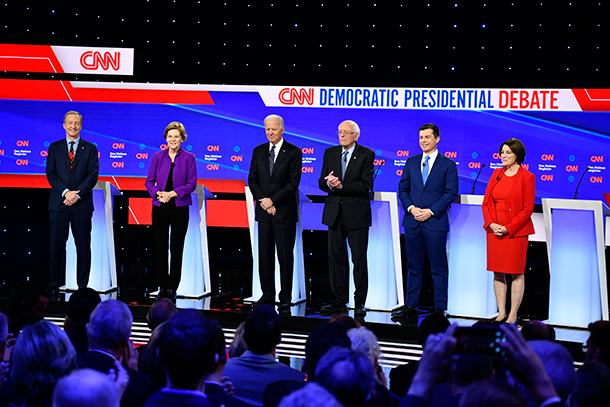
The six Democratic Presidential candidates agree on recommitting to the Paris Climate agreement if elected in 2020. From left to right: Tom Steyer, Elizabeth Warren, Joe Biden, Bernie Sanders, Pete Buttigieg, and Amy Klobuchar. (Photo: CNN)
STEYER: I absolutely am. Look, we invested in every part of the economy. And over 10 years ago I realized that there was something going on that had to do with fossil fuels, that we had to change. So I divested from fossil fuels. I took the Giving Pledge to give most of my money away while I'm alive. And for 12 years I have been fighting the climate crisis. I have beat oil companies in terms of clean air laws. I have stopped fossil fuel plants in Oxnard, California. I fought the Keystone pipeline. I have a history of over a decade of leading the climate fight successfully.
PFANNENSTIEL: Thank you, Mr. Steyer.
STEYER: So actually, yes, I am the person here who has the chops and the history that says, I'll make it priority one, because I have been doing it for a long time.
CURWOOD: The Trump Administration has moved to roll back a number of environmental rules including NEPA, the National Environmental Policy Act, and you can find details of that on the Living on Earth website. Senator Warren was next in the debate and she was asked about the rollback.
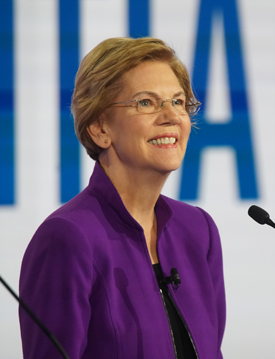
Senator Elizabeth Warren plans to invest $3 trillion to expand renewable energy. (Photo: CNN)
WARREN: Climate change threatens every living thing on this planet. And the urgency of the moment cannot be overstated. I will do everything a president can do all by herself on the first day. I will roll back the environmental changes that Donald Trump is putting in place. I will stop all new drilling and mining on federal lands, and offshore drilling. That will help us get in the right directions. I'll bring in the farmers. Farmers can be part of the climate solution. We should see this though for the problem it is. Mr. Steyer talks about it being problem number one. Understand this, we have known about this climate crisis for decades. Back in the 1990s we were calling it global warming, but we knew what it was. Democrats and Republicans back then were working together because no one wanted a problem. But you know what happened? The industry came in and said, we can make big money if we keep them divided and make no change. Priority number one has to be taking back our government from the corruption. That is the only way we will make progress on climate, on gun safety, on health care, on all of the issues that matter to us.
PFANNENSTIEL: Thank you, Sen. Warren.
Sen. Klobuchar, some of your competitors on this stage have called for an all-out ban on fracking. You haven't. Why not?
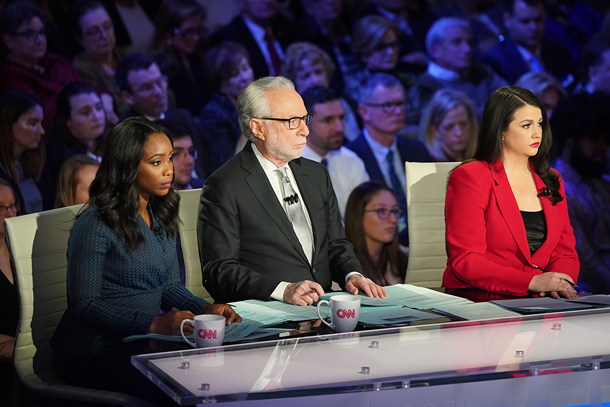
CNN’s Abby Phillip (left) and Wolf Blitzer (center), and the Des Moines Register's Brianne Pfannenstiel. (Photo: CNN)
KLOBUCHAR: Well, first of all, I would note that I have 100 percent rating from the League of Conservation Voters. And that is because I have stood tall on every issue that we have talked about up here when it comes to this administration, this Trump administration, trying to reverse environmental protections. I think it is going to lead to so many problems. And one thing that hasn't been raised, by the way, is the rules on methane, which is actually one of the most environmentally dangerous hazards that they have recently embarked on. And I would bring those rules back as well as a number of other ones. When it comes to the issue of fracking, I actually see natural gas as a transition fuel. It's a transition fuel to where we get to carbon neutral. Nearly every one of us has a plan that is very similar. And that is to get to carbon neutral by 2045 to 2050, to get to by 2030 to a 45 percent reduction. And I want to add one thing that no one's really answered. When we do this, we have to make sure that we make people whole.
CURWOOD: Senator Sanders was next.
SANDERS: Let's be clear. If we as a nation do not transform our energy system away from fossil fuel, not by 2050, not by 2040, but unless we lead the world right now — not easy stuff— the planet we are leaving our kids will be uninhabitable and unhealthy. We are seeing Australia burning. We saw California burning. The drought here in Iowa is going to make it harder for farmers to produce the food that we need. This is of course a national crisis. I introduced legislation to indicate it's a national crisis. We have got to take on the fossil fuel industry and all of their lies and tell them that their short-term profits are not more important than the future of this planet. That's what the Green New Deal does. That's what my legislation does. And that is what we have to do.
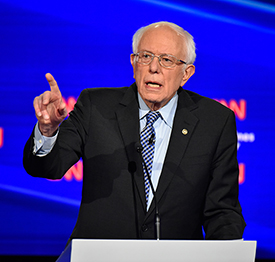
Senator Bernie Sanders spoke about climate change as an economic and social justice issue and was the first presidential candidate to back the Green New Deal. (Photo: CNN)
PFANNENSTIEL: Vice President Biden, your response?
BIDEN: My response is, back in 1986, I introduced the first climate change bill — and check PolitiFacts; they said it was a game-changer. I've been fighting this for a long time. I headed up the Recovery Act, which put more money into moving away from fossil fuels to — to solar and wind energy than ever has occurred in the history of America. Look, what we have to do is we have to act right away. And the way we act right away is, immediately if I'm elected president, I'll reinstate all the mileage standards that existed in our administration which were taken down. That's 12 billion gallons of gasoline — barrels of gasoline to be saved immediately. And with regard to those folks who in fact are going to be victimized by what's already happened, we should be investing in infrastructure that raises roads, makes sure that we're in a position where we have — that every new highway built is a green highway, having 550,000 charging stations. We can create — and this is where I agree with Tom — we can create millions of good-paying jobs. We're the only country in the world that's ever taken great crisis and turned it into great opportunity. And one of the ways to do it is with farmers here in Iowa, by making them the first group in the world to get to net zero emissions by paying them for planting and absorbing carbon in their fields right — there's more to say, but I know my time is...
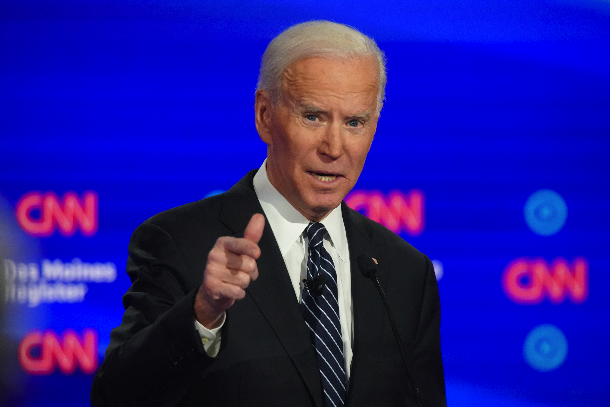
Former Vice President Joe Biden plans to include emission reduction in foreign policy agreements. (Photo: CNN)
CURWOOD: Mr. Biden cut himself off as his time ran out and the moderators moved on to another topic. In sum, all six of the top polling democratic presidential candidates pretty much agreed on the need to address climate disruption. The Iowa caucus is scheduled for February 3rd. The next Democratic presidential debates are February 7th and February 19th, just before the New Hampshire primary and the Nevada caucus respectively. Those excerpts from the Democratic presidential debate in Des Moines, Iowa on January 14th came to us courtesy of CNN. And there is more on the race for the White House on the Living on Earth website, loe.org.
Links
Living on Earth wants to hear from you!
Living on Earth
62 Calef Highway, Suite 212
Lee, NH 03861
Telephone: 617-287-4121
E-mail: comments@loe.org
Newsletter [Click here]
Donate to Living on Earth!
Living on Earth is an independent media program and relies entirely on contributions from listeners and institutions supporting public service. Please donate now to preserve an independent environmental voice.
NewsletterLiving on Earth offers a weekly delivery of the show's rundown to your mailbox. Sign up for our newsletter today!
 Sailors For The Sea: Be the change you want to sea.
Sailors For The Sea: Be the change you want to sea.
 The Grantham Foundation for the Protection of the Environment: Committed to protecting and improving the health of the global environment.
The Grantham Foundation for the Protection of the Environment: Committed to protecting and improving the health of the global environment.
 Contribute to Living on Earth and receive, as our gift to you, an archival print of one of Mark Seth Lender's extraordinary wildlife photographs. Follow the link to see Mark's current collection of photographs.
Contribute to Living on Earth and receive, as our gift to you, an archival print of one of Mark Seth Lender's extraordinary wildlife photographs. Follow the link to see Mark's current collection of photographs.
 Buy a signed copy of Mark Seth Lender's book Smeagull the Seagull & support Living on Earth
Buy a signed copy of Mark Seth Lender's book Smeagull the Seagull & support Living on Earth

